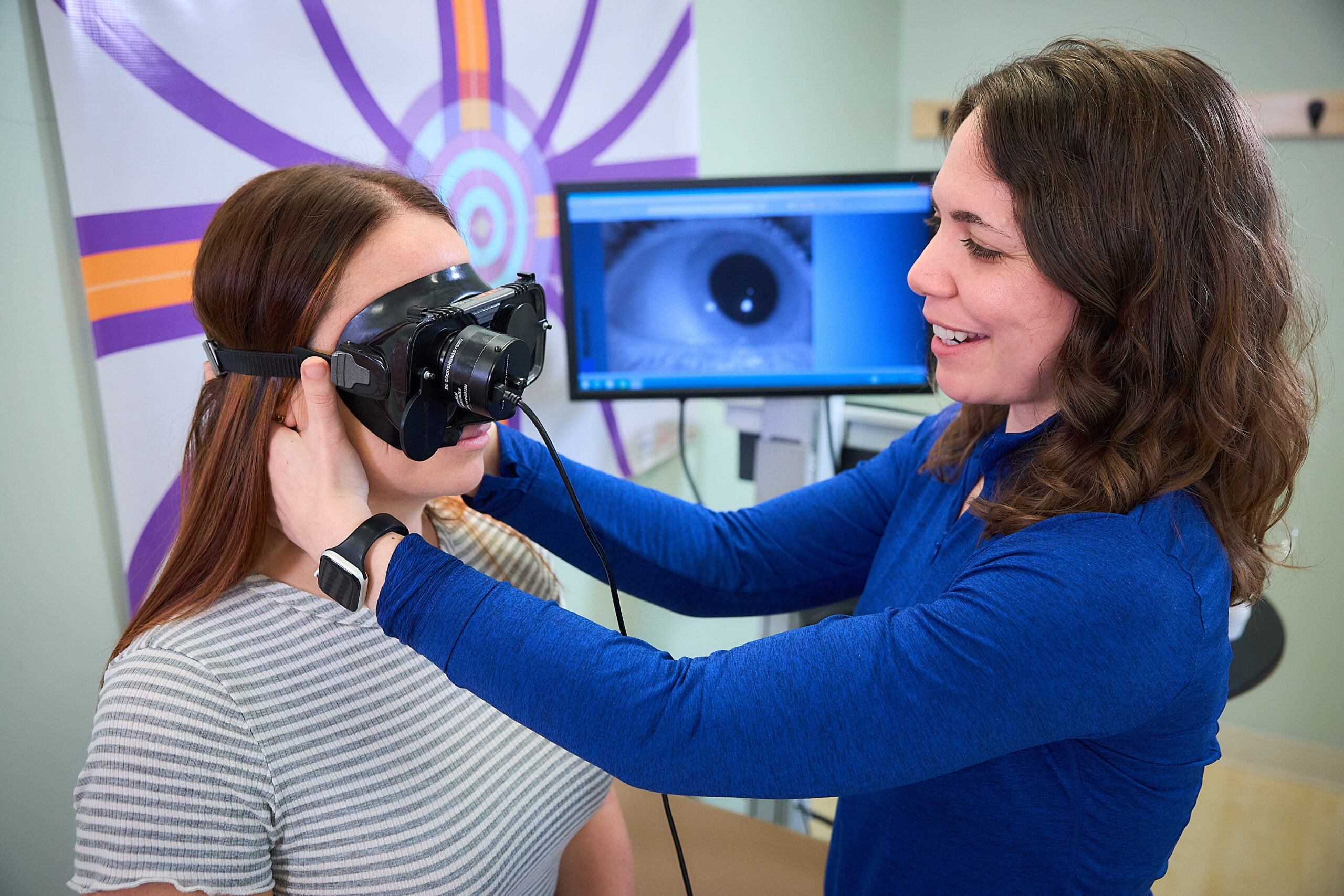
Diagnosing dizziness and balance disorders can be difficult. Symptoms vary from occasional lightheadedness to the room spinning. Patients sometimes don’t know how to explain what they are experiencing.
Good Shepherd Rehabilitation’s expanded Dizziness & Balance Program allows Good Shepherd clinicians to collaborate with referring physicians (including ear, nose and throat specialists) to evaluate patients’ symptoms and screen for vestibular dysfunction.
Thanks to a Good Shepherd Innovation Grant, the Dizziness & Balance Program is now offered at nearly a dozen Good Shepherd locations throughout eastern Pennsylvania.
Grant recipients Kelley Limbauan, PT, DPT, NCS, and Julia Vandenberg, PT, DPT, are a pair of physical therapists who led the coordination of training and equipment for each program site.
“Many people do not know vestibular rehabilitation exists to help abolish dizziness and restore balance, and we’re working to change that,” Kelley said. “With the grant, the first step Julia and I took was to expand and advance vestibular rehab at Good Shepherd’s inpatient and outpatient sites with the Dizziness & Balance Program’s consistent, thorough and evidence-based care. One example of the Innovation Grant’s impact is that we brought infrared video goggles, the gold standard for vestibular care, to program sites as an assessment and treatment tool.”
Good Shepherd Innovation Grants invest significantly in idea generation for team members at both Good Shepherd Rehabilitation and Good Shepherd Penn Partners (Good Shepherd’s joint venture with Penn Medicine), providing employees with the opportunity, time and financial backing to cultivate ideas and critical skills — like the Balance & Dizziness Program.
Vestibular Disorders
Vestibular disorders’ symptoms can include dizziness, vertigo, and balance and equilibrium issues. There are many reasons for vestibular disorders, ranging from a dysfunction in the body’s central nervous system processing center to an infection or displaced crystals in the inner ear.
“The diagnoses we see the most are benign paroxysmal positioning vertigo (BPBV), vestibular hypofunction, dizziness after a concussion, and age-related dizziness and balance issues,” Julia said.
Vestibular Rehabilitation
Through Good Shepherd’s program, an initial patient assessment for vestibular dysfunction includes a one-on-one interview with a specially trained physical therapist. Based on the patient’s symptoms, technology tools for determining a diagnosis include computerized dynamic posturography, which measures how sensory systems integrate. Gaze stability is measured through video head impulse testing.
The newest tool used in the diagnostic phase is the infrared video goggles, which block out visual sensations and allow the physical therapist to see what is going on in the inner ear. All Good Shepherd therapists providing vestibular rehabilitation completed goggle training.
Once a diagnosis is determined, a rehabilitation plan of care is created and implemented. That individualized plan may include low-tech methods as well as high-tech tools.
Dizziness & Balance Program’s Difference
“One of our program’s differentiators is that our therapists are consistently trained and must pass a competency test on vestibular rehab,” Julia said.
As program leaders, Kelley and Julia completed a vestibular rehab multi-day course at Johns Hopkins University Hospital. They then developed the 14 hours of in-person and online coursework and competency training for Good Shepherd physical therapists. Julia also went to each Good Shepherd location to provide hands-on training for using the infrared video goggles.
“Julia and I stay current on vestibular research and clinical skills and continually collaborate with the program’s therapists,” Kelley said. “We hope to train more therapists to specialize in vestibular rehab and bring the Dizziness & Balance Program to all our Good Shepherd sites.”
Locations
The Good Shepherd Dizziness & Balance Program is currently available at Good Shepherd Rehabilitation Hospital and the following outpatient sites:
- Hyland Center for Health & Technology (Allentown)
- Allentown (Cedar Crest Blvd.)
- Center Valley
- East Greenville
- Forks Township
- Kutztown
- Palmerton
- Pottsville
- Souderton
- Stroudsburg
Learn more about Good Shepherd’s Dizziness & Balance Program or call 1.888.44.REHAB (73422).
